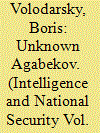| Srl | Item |
| 1 |
ID:
124569


|
|
|
|
|
| Publication |
2013.
|
| Summary/Abstract |
Japan's diplomatic codes were broken by the Soviet Union in the late 1930s. This was due to Kozo Izumi (1890-1956), a Japanese diplomat and Soviet specialist stationed in Eastern Europe, who provided Japan's code books and keys to the Soviet secret police. Married to a Muscovite of noble origin working for the Soviet Foreign Intelligence, Izumi was entrapped and ultimately chose love over country. He thus led an unwitting Japan to conduct 'open diplomacy' towards the Soviet Union.
|
|
|
|
|
|
|
|
|
|
|
|
|
|
|
|
| 2 |
ID:
124570


|
|
|
|
|
| Publication |
2013.
|
| Summary/Abstract |
The article argues that signals intelligence was an organizational accomplishment in the sense of requiring a) the establishment of an independent organization and b) that this organization combine cryptanalysis with intelligence analysis, traffic analysis and interception. This was not pre-ordained but the outcome of specific conflicts and decisions at Bletchley Park during the first three years of the Second World War which transformed the Government Code and Cypher School from a cryptanalytical bureau to a fully-fledged signals intelligence agency. Detailed archival evidence is presented in support of this claim.
|
|
|
|
|
|
|
|
|
|
|
|
|
|
|
|
| 3 |
ID:
124571


|
|
|
|
|
| Publication |
2013.
|
| Summary/Abstract |
This article analyses the development and failure of a plan by the Special Operations Executive (SOE) to use a small-scale mutiny by German troops in Greece in 1944 to engender a widespread uprising within the Reichsarbeitsdienst and the ranks of non-German troops serving in the Wehrmacht. Through an analysis of this operation, codenamed 'Kitchenmaid', an assessment will be made of the capabilities and motivations of SOE's Greek section (Force 133); the problem of its cooperation with Greek communist guerrillas in relation to British foreign policy towards Greece; and the strategic and political value of 'Kitchenmaid'.
|
|
|
|
|
|
|
|
|
|
|
|
|
|
|
|
| 4 |
ID:
124572


|
|
|
|
|
| Publication |
2013.
|
| Summary/Abstract |
This article examines British signals intelligence on Egypt during the 1956 Suez Crisis, the 1958 Middle East Crisis and the Egyptian intervention in the Yemen. It explains the production of signals intelligence and reviews the evidence that GCHQ could read Egyptian and other Arab communications. It then identifies some of the intelligence provided by GCHQ and considers its influence on British policy.
|
|
|
|
|
|
|
|
|
|
|
|
|
|
|
|
| 5 |
ID:
124573


|
|
|
|
|
| Publication |
2013.
|
| Summary/Abstract |
This article contends that, in the period under study, government security agencies in both colonial and post-colonial Sudan have failed to dominate society. It attributes this failure to the limited resources and limited ambitions of the state, and the fact that its security organs were thus weakly institutionalized. The fact that these failures persisted after independence, in spite of the efforts of post-colonial governments to expand their intelligence agencies, demonstrated the divisions within the state and the extent to which it could be captured by competing political and social groups.
|
|
|
|
|
|
|
|
|
|
|
|
|
|
|
|
| 6 |
ID:
124574


|
|
|
|
|
| Publication |
2013.
|
| Summary/Abstract |
During World War II, German naval codebreakers in the B-Dienst made extensive breaks into Naval Cypher No. 3, an enciphered code used by the Allies for the vital Atlantic convoys. It is often suggested that they did not discover that Cypher No. 3 was insecure until May 1943. This article shows that the British had learned about this much earlier, in August 1942, and that they informed the US Navy then. British solutions of messages encrypted with the Wehrmacht's Tunny teleprinter cipher machine had revealed that the B-Dienst was solving Naval Cyphers Nos. 3 and 4. Surprisingly, those ciphers were not replaced until June 1943.
|
|
|
|
|
|
|
|
|
|
|
|
|
|
|
|
| 7 |
ID:
124575


|
|
|
|
|
| Publication |
2013.
|
| Summary/Abstract |
The decision to declassify selected historical documents from the archives of the Security Service in 1997 has been a boon to academic historians of intelligence. The declassified files reveal the successes and failures of the Security Service in fulfilling its statutory function of defending the realm. Yet the activity of Soviet spies continues to be one of the most challenging topics in intelligence history. The role of Soviet defectors in transforming the Security Service's understanding of the nature and extent of Soviet intelligence operations, meanwhile, remains largely understudied. In the case of Agabekov, for example, the reaction of SIS or MI5 to his 'disappearance' in the spring of 1938 has long been neglected. It is possible that there was no reaction at all, because both services had long-since written off Agabekov as a source. This helps explain why Agabekov's case has been ignored in the relevant literature in both Russia and the West.
|
|
|
|
|
|
|
|
|
|
|
|
|
|
|
|